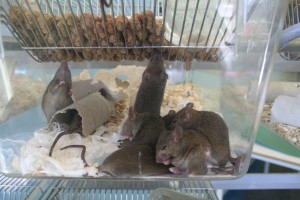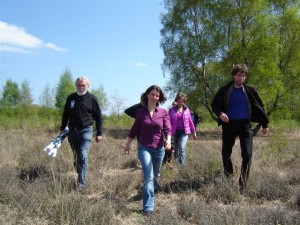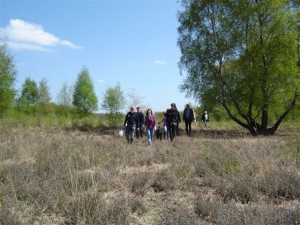Nieuw Worldlog Marianne Thieme
Geweldig, we hebben bijna 100.000 m² van de meest kwetsbare natuur op de veiling van Staatsbosbeheerkunnen vrijkopen! In 2,5 week hebben we een kwart miljoen euro opgehaald met alleen sociale mediaoproepen, radiospots en steun van het radioprogramma Vroege Vogels en onze eigen leden. We hebben daarmee de meest kwetsbare natuurwaarden beschermd tegen de markt. Voor zover bekend is dit het grootste burgerinitiatief op het gebied van natuuraankoop ooit. Meer informatie over de natuurveiling en onze actie kan je terugvinden in mijn Worldlogs van de afgelopen twee weken.
Ik ben heel blij dat zoveel natuurbeschermers zich achter deze positieve actie hebben geschaard om kwetsbare stukken natuur te redden. Het feit dat we in zo’n korte tijd zo’n groot bedrag hebben opgehaald geeft aan dat mensen de afbraak van de natuur zeer aan het hart gaat. De Partij voor de Dieren zal zich overigens – binnen en buiten het parlement – blijven verzetten tegen de verdere uitverkoop van de natuur. Een overheid die aangeeft natuur niet hoger te waarderen dan de prijs van de ondergrond kent kennelijk wel de prijs maar niet de waarde van natuur. Deze prachtige uitspraak van John Sawhill is geheel op deze zaak van toepassing: A society is defined not only by what it creates, but by what it refuses to destroy.
Dat wij het hoogste bod hebben uitgebracht op een aantal percelen is helaas nog geen garantie dat de partij de natuur ook daadwerkelijk verwerft. Na de afslagfase van de veiling volgt nog de gunningsfase tot 24 mei. De huidige eigenaar Staatsbosbeheer moet de nieuwe eigenaar de kavels natuur gunnen. Wordt dus vervolgd!
Afgelopen week heb ik in het debat over dierproeven de staatssecretaris van Economische Zaken gevraagd om samen met de industrie, academische wereld, onderwijs en maatschappelijke organisaties te investeren in alternatieven voor dierproeven. Onderzoeksbureau ZonMW maakte eerder duidelijk dat in 2025 het gebruik van proefdieren met 40 procent kan worden gereduceerd en dat daarmee de kwaliteit van de gezondheidszorg zal verbeteren en werkgelegenheid wordt bevorderd.
De meest recente cijfers laten zien dat het aantal proefdieren in Nederland met 2,5 procent is gestegen in 2011. In dat jaar waren er in Nederland ruim één miljoen proefdieren en 589.853 experimenten zijn uitgevoerd op levende dieren. Naast dit aantal dieren worden er nog een half miljoen dieren meteen afgemaakt in proefdierlaboratoria omdat ze, nadat ze gefokt te zijn, niet voldoen aan de selectiecriteria voor een proef.
Er is alle reden om in te zetten op proefdiervrije technieken. Dieren zijn geen mensen. Van alle medicijnen die met behulp van dierproeven zijn ontwikkeld, valt alsnog zo’n negentig procent af wanneer het in klinische trials wordt getest bij de mens. Voor effectievere behandelmethoden zijn nieuwe modellen nodig. Laten we daar op in zetten in het belang van mens en dier.
Nederland is weliswaar gezakt van de vierde naar de tiende plaats, maar we staan nog steeds in de top 10 van landen die het wreedst omgaan met dieren. Wij blijven in ieder geval ons best doen om Nederland hieruit te krijgen!
En weet jij wat een hamburger echt kost? Kijk naar dit filmpje om alle verborgen kosten van een hamburger te ontdekken.
Weer adembenemende foto’s bij the Big Picture van The Boston Globe! Dit keer een fotoreportage van de National Geographic Traveller 2013.
Tot volgende week, Marianne
Wonderful! We managed to buy the freedom of almost 100,000 square meters of the most vulnerable nature at the auction of Staatsbosbeheer! In 2.5 weeks’ time, we managed to raise a quarter of a million Euros by social media calls, radio spots and support from the radio show Early Birds, and our own members. By doing so we are protecting the most vulnerable nature values against the market. As far as we know, it was the biggest citizens’ initiative ever to buy nature. More information about the nature auction and our action can be found in my Wordlogs of the past two weeks.
I am really pleased that so many nature protectors supported our positive action to save the weak plots of nature. The fact that we managed to raise so much money in such a short time shows that people are concerned about the deterioration of nature. But the Party for the Animals will continue to oppose to the further sale of nature, inside and outside Parliament. A government that shows not to value nature more than the price of the ground it is on, is obviously a government that knows the price but not the value of nature. The great quote by John Sawhill fully applies to this case: A society is defined not only by what it creates, but by what it refuses to destroy.
Being the highest bidder is unfortunately no guarantee that the Party will actually obtain the plots of nature. After the descending price process at the auction, the awarding process is on until the 24th of May. The current owner, the National Forest Service, has to award the plots to the new owner. To be continued!
In the debate about animal testing last week, I asked the State Secretary of Economic Affairs to jointly invest with the industrial sector, academic world, education and social organisations in finding alternatives for animal testing. Research Agency ZonMW recently made clear that the use of test animals can be reduced by 40 per cent in the year 2025, and that the quality of healthcare and the employment will improve as a result.

Most recent figures show that the number of test animals in the Netherlands has risen by 2.5 per cent in 2011. In that year, there were more than one million test animals in the Netherlands and 589,853 experiments were carried out on live animals. In addition to this number of animals, there are another half a million animals that are put down immediately in test animal laboratories, because they, after breeding them, do not meet the selection criteria for a test.
There is every reason to aim for animal test-free technologies. Animals are not humans. Approximately ninety percent of all medicines developed with animal testing drop out when tested on humans by means of clinical trials. New models are needed for more effective treatment methods. Let’s aim for that in the interest of humans and animals.
It’s true that the Netherlands has dropped from the fourth to the tenth place, but we are still in the top 10 of countries that are most cruel to animals. We will continue to do our best to get the Netherlands out of this top 10!
And do you know what the real price is of a hamburger? Watch this short film to discover all the hidden costs of a hamburger.
And again some breathtaking pictures at the Big Picture of The Boston Globe! This time it is a photo report of the National Geographic Traveller 2013.
See you next week, Marianne


